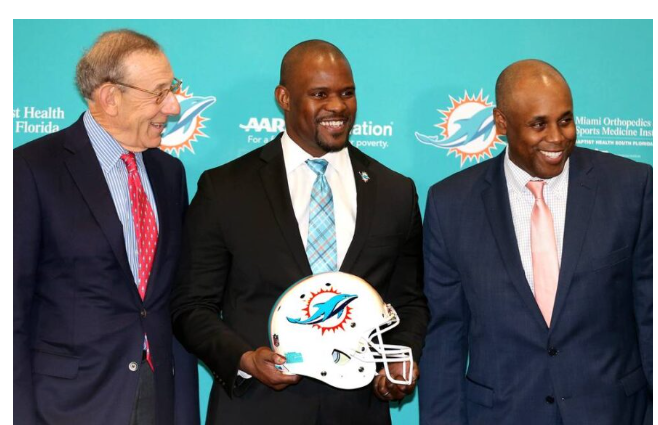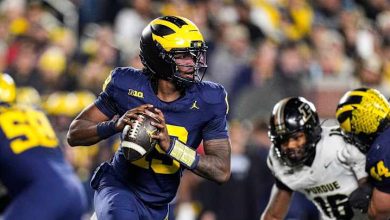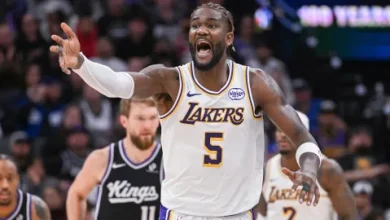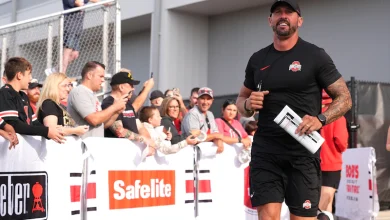Report: To settle debts, Miami Dolphins administration is requesting £5.3 million from fans.

The Miami Dolphins’ defensive line should undoubtedly be a strength of the team once again in 2023, but there’s a glaring remaining task — or two — that should be checked off the to-do list this offseason.
The Dolphins need to reach a long-term extension with standout defensive tackle Christian Wilkins, who is set to play on the fifth year of his rookie contract in 2023 after that option was exerci …
hen a trio of Michigan undergraduates approached him a dozen years ago for advice about starting their own sports business conference while attending one at Northwestern’s Kellogg School of Management, Stephen Master had a mixed reaction.
A Michigan alum who headed Nielsen’s global sports practice, Master was confident that the school had enough loyal, engaged grads working in sports to fill their panels. But the seniors in the group wanted to get rolling in time for it to benefit them when they hit the job market. It was already November, which only gave them a few months.
Master warned against it.
“You have one of the greatest assets there is — a Michigan football season,” he told them when they suggested a January date. “If you don’t take advantage of that, you’re setting yourself up to fail.”
When the students eventually agreed, Master offered to put together a small advisory board to help them. Three other Michigan grads joined him: Seth Ader, VP of brand marketing at ESPN; Ira Stahlberger, then of IMG, now SVP of talent representation at WME; and John Shea, then of Gatorade, now CMO at Mark Anthony Brands.
Their first call on behalf of the students was an obvious one. Stephen Ross, owner of the Miami Dolphins, is a prominent Michigan donor whose name adorns the business school. Ross immediately embraced the idea of bringing a sports business conference to campus and was doubly happy to hear that it could be on a weekend when he planned to attend a football game.
Not only did Ross offer to keynote the inaugural event, he said he’d invite Bob Bowman, the longtime head of MLB Advanced Media, whose daughter was a freshman at Michigan. The eventual roster for the debut event in November 2012 also included CBS Sports president David Berson and Shark Tank regular Rohan Oza, both Michigan alums.
In the years since, keynoters have included John Collins, Ari Emmanuel, Don Garber, Dan Gilbert, Steve Greenberg, David Levy, Sean McManus, John Skipper, DeMaurice Smith, Arn Tellem and Jeff Wilpon. Last year featured then-Big Ten commissioner Kevin Warren, NFL Chief Media Officer Brian Rolapp and ESPN Chairman Jimmy Pitaro.
Often, the connections are familial. All three original advisory board members not only graduated from Michigan, but also sent children there. Emmanuel, who has appeared twice, also is a Michigan parent. Rolapp’s son was a Michigan football walk-on. Last year, Pitaro brought his daughter, a high school junior, who tacked on an admissions tour.
An event born of an out-of-the-maize-and-blue conversation at a Northwestern B-school conference is now planning its 12th annual event in November. About 800 attended last year.
“We like to say that ESPN and NBC and the other networks are all great,” said Master, who left Nielsen in 2018 and co-founded Amaze Media Labs in 2020, “but the best network in sports is Michigan.”
While the depth and heft of industry-connected alums unquestionably fueled the conference’s rapid ascent, it remains student run. An industry advisory board participates in a monthly call and helps open doors to speakers, but a cadre of 30 undergrads organizes a weekend of activities that begins with a Thursday night dinner at Michigan Stadium, includes a full Friday slate of speakers and panels, and wraps up with a tailgate party on Saturday.
Michigan may lay claim to being the largest student-run conference of its kind, but it is far from alone. Sports business clubs and sports administration and law programs at universities across the country have hosted events of varying size and scope for decades, with the larger events attracting 200 to 300 attendees.
Some have a decidedly academic bent. But many incorporate speakers and panelists from across the sports industry, often featuring alumni who come back to network with colleagues and connect with job and internship candidates.
“The idea is to get our students together with industry leaders and also faculty researchers to focus on issues,” said Matt Brown, chair of South Carolina’s sport and entertainment management program, which has hosted a venue-focused conference annually since 2001. “Our students will be the ones solving those issues very soon. So what are those? What are trends? It’s all meant to kind of prepare them for their future journey.”
The University of Massachusetts conference, now known as the McCormack Sports Leaders Forum, was run entirely by students from its inception eight years ago until 2019. That’s when the school’s sports management program formally took ownership of the event as part of a sponsorship agreement with sports marketing agency Scout Sports & Entertainment.
UMass planned to relocate the annual event to Scout’s New York City offices, taking advantage of the location to make it easier to land top-flight speakers and create networking opportunities for students and alumni.
“From an awareness and reputational standpoint, we thought we could take it to the next level if we used more department resources,” Steve McKelvey, chair of the school’s sports management department, said. “It’s one thing for a student club to put together a conference on campus. It’s another thing to take it to New York.”
The first year of the arrangement went swimmingly, with a capacity crowd that included about 130 students from UMass and other sports management programs and representatives from about 30 sports organizations. Burke Magnus, ESPN president of content; and New York Islanders co-owner Jon Ledecky keynoted.
Unfortunately, plans to return to New York the following year were scuttled by COVID. The conference was canceled in 2020 and moved online in 2021. Last year’s event was held on campus, as was this year’s in April, which featured ESPN analyst and 33rd Team founder Mike Tannenbaum, a UMass alum. Programming also included panels on diversity, equity and inclusion, startup leagues and sports betting, along with one titled “First Year Out” that featured four recent graduates from the program.
The school hopes to return to the road next year, rotating between Boston, New York and Amherst, McKelvey said.
The event is largely run by undergraduate students, who identify topics and approach potential panelists, many recommended by faculty and staff. Students also handle sales and moderate panels.
Typically, about half of the panelists are UMass alums.
“It provides a great opportunity for us to engage our alums and for our alums to give back, but also for us to expose UMass and our students to non-alums,” McKelvey said. “What that does is open up new avenues to internships and jobs for our students. And [the event] provides our students with a professional development and networking opportunity.”
South Carolina has taken advantage of that interaction between industry and its sports management program by pairing its annual Sports Entertainment and Venues Tomorrow conference with a career fair for the past 20 years.
The conference, held in various iterations since 1987, mixes industry speakers and panels with academic research presentations. Last year featured SEC Commissioner Greg Sankey as a keynote. Charlotte Hornets CEO Fred Whitfield is scheduled to headline in November.
“It’s getting industry leaders down to talk to our students and learn about what we do,” said Brown, the director of the South Carolina program. “It benefits our students greatly to hear from these industry leaders, but it also benefits our program because people get to know us and what we’re doing here and meet our students and hear our story as well.”
When the director of the University of Miami’s entertainment, arts and sports law program invited Eric Woolworth, Miami Heat president of business operations, to sit on the opening panel of the school’s Global Entertainment and Sports Law + Industry conference held in March, Woolworth reminded him that he had not practiced in 15 years.
Gregg Levy told him that was one of the reasons they wanted him.
“There are enough lawyers at these conferences,” said Levy, who has managed the conference since UM Law launched its sports and entertainment focused degree program in 2015. “Law schools too often separate the practice of law from the industry. To us, you can’t pull those apart. You can’t be an effective lawyer if you don’t understand your client’s business. So we combine those in a very deliberate way in the conference.”
The UM Law conference has roots as a student-run event launched nearly 40 years ago, with entertainment law as its focus. When UM brought entertainment, sports and arts law together under a single umbrella, it saw the opportunity to expand the event to serve all three.
This year’s two-day event in March had an NIL panel featuring NFLPA executive director DeMaurice Smith and OneTeam Partners licensing head Eric Winston; a player safety panel with WNBPA executive director Terri Jackson and LPGA lawyer Liz Moore; a general counsels panel with GCs from the Buffalo Bills, Miami Dolphins, Tennessee Titans and NYCFC; and a funding-focused conversation with Angel City FC co-founder Julie Uhrman. Other panels focused on entertainment and art, with one brid





